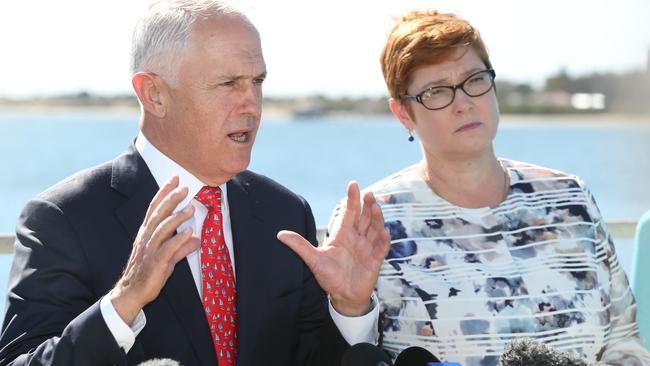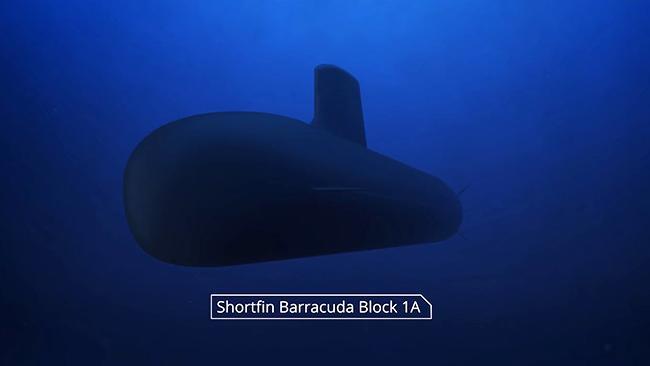Marise Payne: Adelaide at heart of all major naval shipbuilding acquisitions for decades to come
THE decision to build our Future Submarines in Adelaide places South Australia at the centre of our hi-tech future economy for decades to come, writes Defence Minister Marise Pyne.

Opinion
Don't miss out on the headlines from Opinion. Followed categories will be added to My News.
- Victory: 12 subs to be built in Adelaide
- Reaction: What the major players say about the announcement
- Senator David Leyonhjelm: Why are we still treating SA like a charity?
- How the Barracuda submarine differs from the Collins Class
THE decision to build our Future Submarines in Adelaide places South Australia at the centre of our hi-tech future economy for decades to come.
This is a historic day for the future of our naval manufacturing industry and SA. The decision to build at the Osborne shipyard will secure thousands of long-term, highly skilled trade and technical jobs.
As outlined in the Integrated Investment Program, released with the 2016 Defence White Paper, the program is expected to cost more than $50 billion, and will sustain around 1100 direct jobs and around 1700 jobs through the supply chain.
Not only is this decision good for Adelaide and Australia, it is good for the future submarines and for our navy. We must have the sovereign ability to operate and sustain the future submarines here in Australia without undue reliance on another country.
Following our comprehensive competitive evaluation process, it is clear that this is best done by building the submarines here so that we can establish and maintain a capable industry base and skills here in Australia.
The question of why Australia needs submarines is sometimes asked. As detailed in the 2016 Defence White Paper, submarines are a strategic capability, which provides Australia with substantial advantages in a challenging maritime environment in our region.
The Turnbull Government’s decision to expand our submarine fleet to 12 regionally superior submarines is a decision driven by national security. As set out in the White Paper, by 2035 around half of the world’s submarines will be operating in the Indo-Pacific region.
The decision that the Turnbull Government has taken on the future submarines builds on the decisions on naval surface ships that we announced last week. Beginning with two of the first Offshore Patrol Vessels in 2018 and moving to the more than $35 billion Future Frigate program in 2020, these ships will also be built in Adelaide.
For the first time, these three naval programs together will secure a permanent naval shipbuilding industry in Australia and naval manufacturing base in Adelaide. They will put an end to the painful boom-bust cycle that has afflicted the industry for far too many years.
When the project has finished, employees have been retrenched, their valuable skills and experience lost to other industries, and facilities mothballed.
The lack of planning and certainty in the past has also meant that each time the Government placed a new order for a naval vessel from an Australia shipyard we have been forced to start cold, rebuilding the workforce, skills and supply chains. This is one of the reasons why it has been harder for Australia to be cost-competitive at making naval vessels.
These historic decisions are not an overnight, cure-all solution for the current downturn in the shipbuilding industry. For that to be avoided the previous Labor government would have needed to begin ordering new vessels during their time in office.
Instead they slashed Defence’s budget by more than $18 billion, delayed more than 100 defence projects and failed to order a single naval vessel from an Australian shipyard in six years.
The Turnbull Government’s decisions on the more than $50 billion future submarine program, the more than $35 billion future frigate program and the more than $3 billion offshore patrol vessel program will put a stop to this downturn and protect as many jobs as possible.

Assuring jobs is a good thing for Adelaide, Australian industry, and importantly, a good thing for naval capability because the people holding those jobs have valuable skills and experience that we need to retain to work on the upcoming projects.
These skills are valuable; they help reduce the risks of starting from cold on the future frigate and future submarine programs — risks that cost the taxpayers and that delay the delivery of critical naval capabilities.
Creating a continuous shipbuilding industry will be a truly national endeavour. It will require the co-operation of industry, the unions, our research and scientific organisations, our educational institutions, state and federal governments and Defence to ensure we have a naval manufacturing industry that is competitive and truly world-class.
It will be a challenge, but it is one that offers huge benefits for South Australia, our navy and our national security.
Of course, the Turnbull Government’s commitments to industry, and defence industry in particular, do not end with these announcements or with naval shipbuilding generally.
As the Prime Minister, South Australia’s own Minister for Industry and I announced in March, one of the centrepieces of our new Defence Industry Policy Statement — the Centre for Defence Industry Capability — will be headquartered in Adelaide.
This will be a vital link between local businesses — whether they are manufacturing materials that could be used on the future submarines, or whether they are designing the software that we will need to operate the future frigates — and the shipbuilding programs that will be centred in Adelaide.
The Turnbull Government is completely committed to providing opportunities for Australian industry to participate in all of our Defence capability acquisition and sustainment programs and to reducing the red-tape necessary for them to be part of it — and the Centre for Defence Industry Capability will be at the heart of that.
The centre will also help local businesses to become more competitive, support innovation, and help business access export markets. The opportunities for local businesses to be part of these significant investments are huge.
Future submarines, future frigates and offshore patrol vessels. Adelaide will be at the heart of all major naval shipbuilding acquisitions beginning right now and for many decades to come.
This will create jobs, it will drive local investment and it will create boundless opportunities across many sectors. It truly is an exciting time to be a South Australian.
Marise Payne is Minister for Defence.


